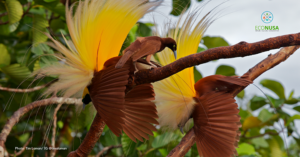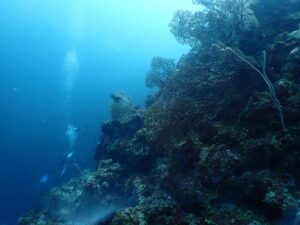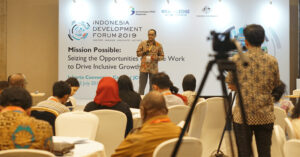
Pigs and wild boars are considered to have a special place in the social and cultural life of the people in Tanah Papua. Wild Boar (Bos Suscrofa) was originally brought by immigrants from Sulawesi (BBM / Bugis-Buton-Makassar) to the tropical forests of the Land of Papua, which until now has been multiplying very rapidly. Unfortunately research on population development has not been carried out, so estimates of the number are not yet available. People in Tambrauw believe the number of wild boar is increasing.
For people in Tambrauw, West Papua, wild boar is preferred because it is a source of protein needs for the family. Wild boar are easily caught and abundant in the forest. On the other hand, its existence poses a threat to the sustainability of other animal populations by becoming predators of turtle eggs on the beach where turtles lay eggs. Wild boar also become pests that eat agricultural crops in community gardens. Paskalis Awak is a native of Kampung Imbuhan who surrounds the forest every day in search of hunted animals and use the forest as a learning tool since childhood. “This boar is like the song” Hate, “but Miss. Hated because they are pests, but longed for being delicious to eat, “Paskalis said.
However, pigs also become a source of livelihood for the community because the meat can be processed and sold outside the region. In order to be marketed outside the region, special treatment is needed. Usually, before being sold, meat is processed through smoking (semi-processing). Hunting communities in Imbuan can earn between Rp500,000 and Rp.1 million per head, depending on the size of the pig. “Many Westerners in cafes outside the area who like to consume sausage made from wild boar meat from Tanah Papua,” said Paskalis.
Bustar Maitar, CEO of the EcoNusa Foundation, confirmed the statement. He added that in addition to pests for community agriculture, it also became pests for the eggs of leatherback turtles (Dermochelys coriaceae) at the Jamursba Medi Wildlife Sanctuary. This reserve has become the largest turtle nesting beach in Indonesia, including defeating Kamiali-Lae Beach, Papua New Guinea. “We are working with indigenous Papuans in Tambrauw District to utilize wild boar meat. In addition, as a form of support for the conservation of leatherback turtles, as well as encouraging communities to preserve the remaining forest ecosystems. Most importantly the community can finally defend their own forests from conversion to oil palm is currently rife in West Papua’s bird’s head, “said Bustar.
One of EcoNusa’s programs is to look for and develop local commodity initiatives that can become “Best Practices” for the management of Natural Resources (PSDA). One of them is the management of wild boar meat in Tambrauw, Sorong and South Sorong Regencies.
At present, the EcoNusa PSDA team is working with the people of Kampung Imbuan to prepare training on smoked meat management. The EcoNusa team met with the community on January 19-24, 2020 to collect production and marketing data and to socialize training plans in Kampung Imbuan, Tambrauw Regency in April. This training will involve several hunter groups from Imbuan Village and from other districts, such as Sorong and South Sorong. To maximize production output, experienced trainers are brought in directly from Kupang. He is experienced in managing smoked or sei meat and a variety of pork-based menus. In addition, the participants were also trained to make souvenirs made from the body parts of wild boar.
Editor: Leo Wahyudi




